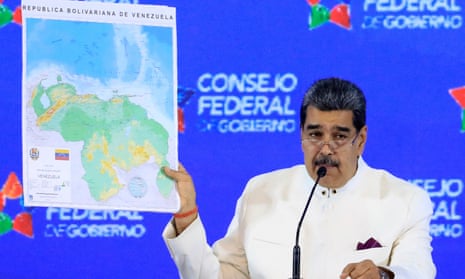Guyana has appealed for help from the United Nations and the United States as the Venezuelan president, Nicolás Maduro, announced a series of measures intended to advance its annexation of two-thirds of the South American nation’s territory.
“I have spoken to the secretary general of the United Nations and several leaders, alerting them of these dangerous developments and the desperate actions of President Maduro,” Irfaan Ali, president of Guyana, said in a television broadcast late on Tuesday, as he informed the nation of 800,000 of Maduro’s latest steps intended to create a new Venezuelan state in Guyana.
Ali’s comments came after Maduro announced a series of measures to formalise a referendum on Sunday evening in which voters overwhelmingly backed plans to recognise the 160,000km2 oil-rich swath of Guyanese jungle as its own.
The Venezuelan president said he had ordered a law to be drafted recognising a new state – the Guayana-Esequiba – where the English-speaking residents would be given Venezuelan national ID cards. He also ordered national companies to begin mining and oil extraction operations in the resource-rich region, and for a special military unit to be created for the region, alarming observers and causing Brazil to send armoured vehicles to its border.
This article includes content provided by Instagram. We ask for your permission before anything is loaded, as they may be using cookies and other technologies. To view this content, click 'Allow and continue'.
In videos posted on social media Maduro presented a revised national map showing an enlarged Venezuela which had swallowed up the region of Essequibo, demanding it be rapidly circulated in schools and universities in an attempt to enforce the results of Sunday’s referendum.
“I have immediately ordered for it to be published and taken to all schools, colleges, community councils, public establishments, universities and in all homes in the country, the new map of Venezuela with our Guayana-Esequiba. This is our dear map!” he said, presenting the illustration.
Venezuela has laid claim to Essequibo since it gained independence from Spain, contesting the borders drawn up with the then British colony, Guyana.
The dispute is being arbitrated by the international court of justice but Maduro asked the Venezuelan people on Sunday whether it should disregard the Hague and take matters into its own hands.
Though voter turnout was low and government figures have been widely questioned by observers, the Venezuelan government said 95% of voters agreed to ignore the court and recognise Essequibo as part of Venezuela.
Maduro’s increasingly bellicose rhetoric over Essequibo is seen by analysts as an attempt to distract from a series of overlapping crises at home and drum up support ahead of presidential elections expected for 2024 but the escalation of regional tensions on Tuesday night added to concerns that the dictator would not stop short of military action.
On Wednesday, Venezuela’s attorney general issued an arrest warrant for 10 opposition leaders including Juan Guaidó, Julio Borges and Leopoldo López.
The latest moves to regain political dominance ahead of next year’s elections could be a reaction to the poor turnout for Sunday’s referendum, said Phil Gunson, analyst at International Crisis Group.
“This is typical of the Chavistas. Rather than retreat and reform they are surging ahead with their hardline strategy,” he said.
“The Guyana Defence Force is on high alert,” President Ali said in his television address to the nation. “This is a direct threat to Guyana’s territorial integrity, sovereignty and political independence.”
Ali also accused Venezuela of defying the international court of justice, which last week ordered Venezuela not to take any action until the court rules on the countries’ competing claims – a process which is likely to take years.
Guyana is seeking support from the Caribbean political community, Caricom, the United States and other allies while raising the matter with the UN security council, Ali added, while simultaneously seeking to reassure investors concerned that Maduro could imminently stage a land grab.
“You have nothing to worry about when you invest in a country that governs itself in accordance with the rule of law, that stands on the side of democracy and understands what true freedom is,” Ali said. “So there is nothing to fear. Our international partners and international community are ready to support us. They’ve assured us of their support and all we want is for these missteps to be corrected by President Maduro and Venezuela.”
